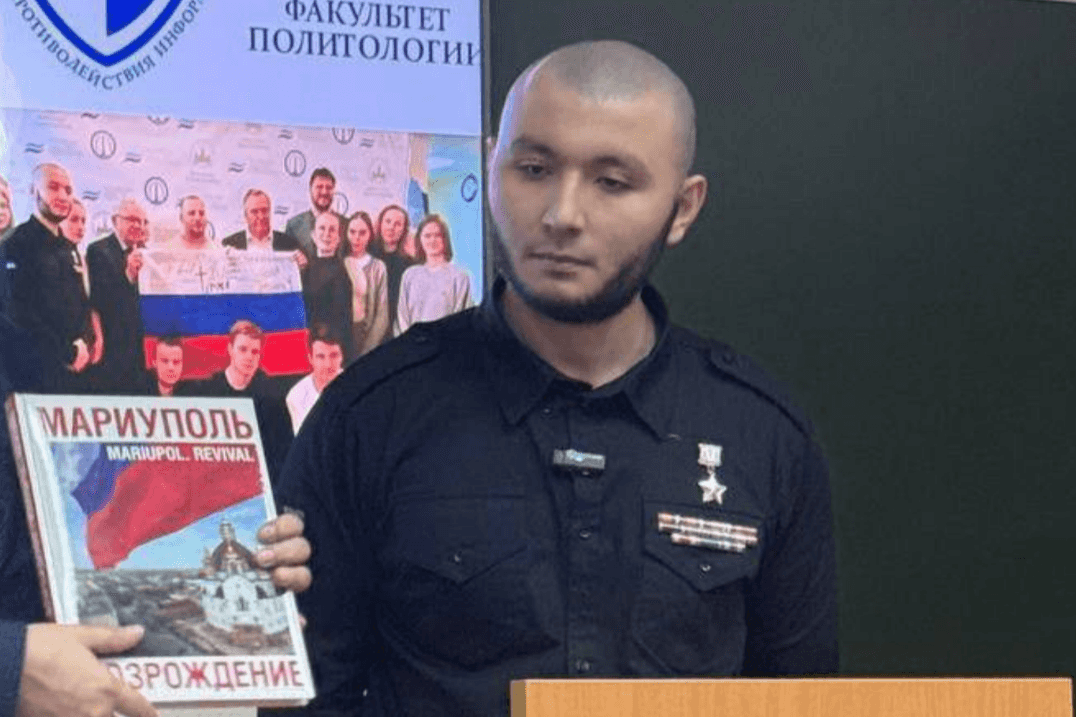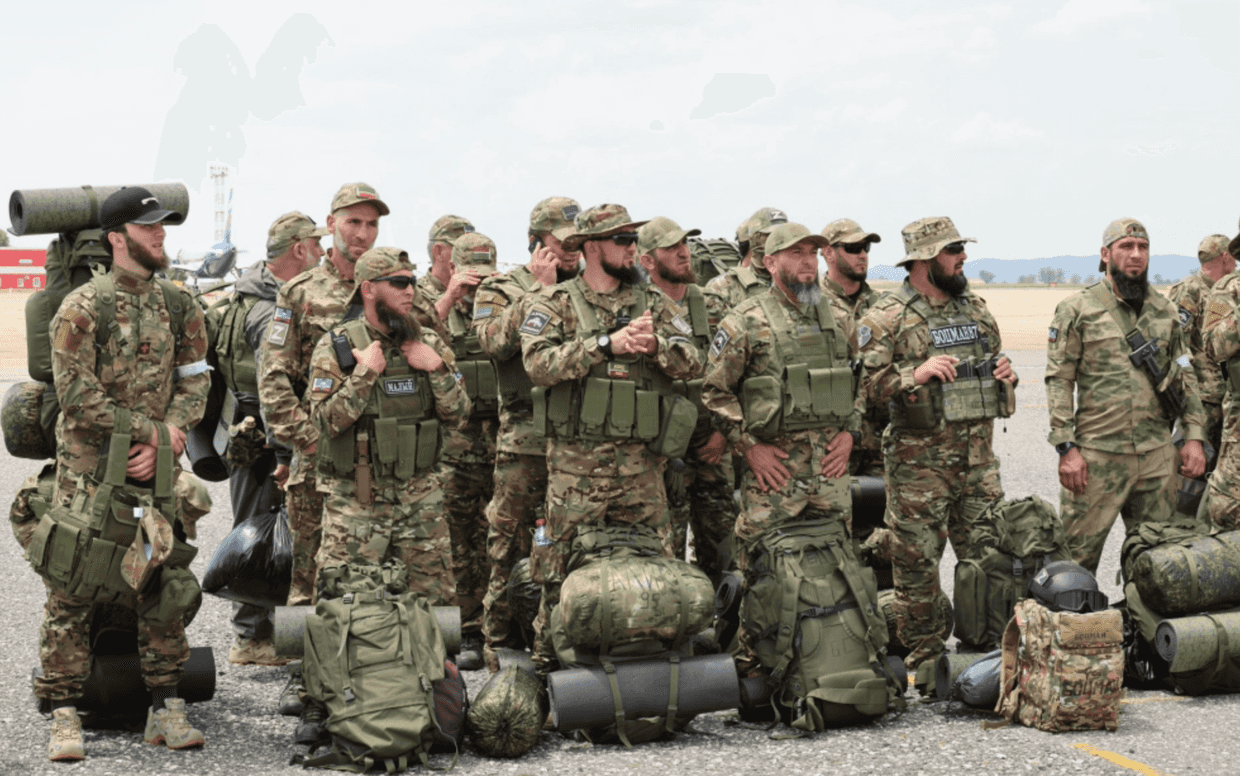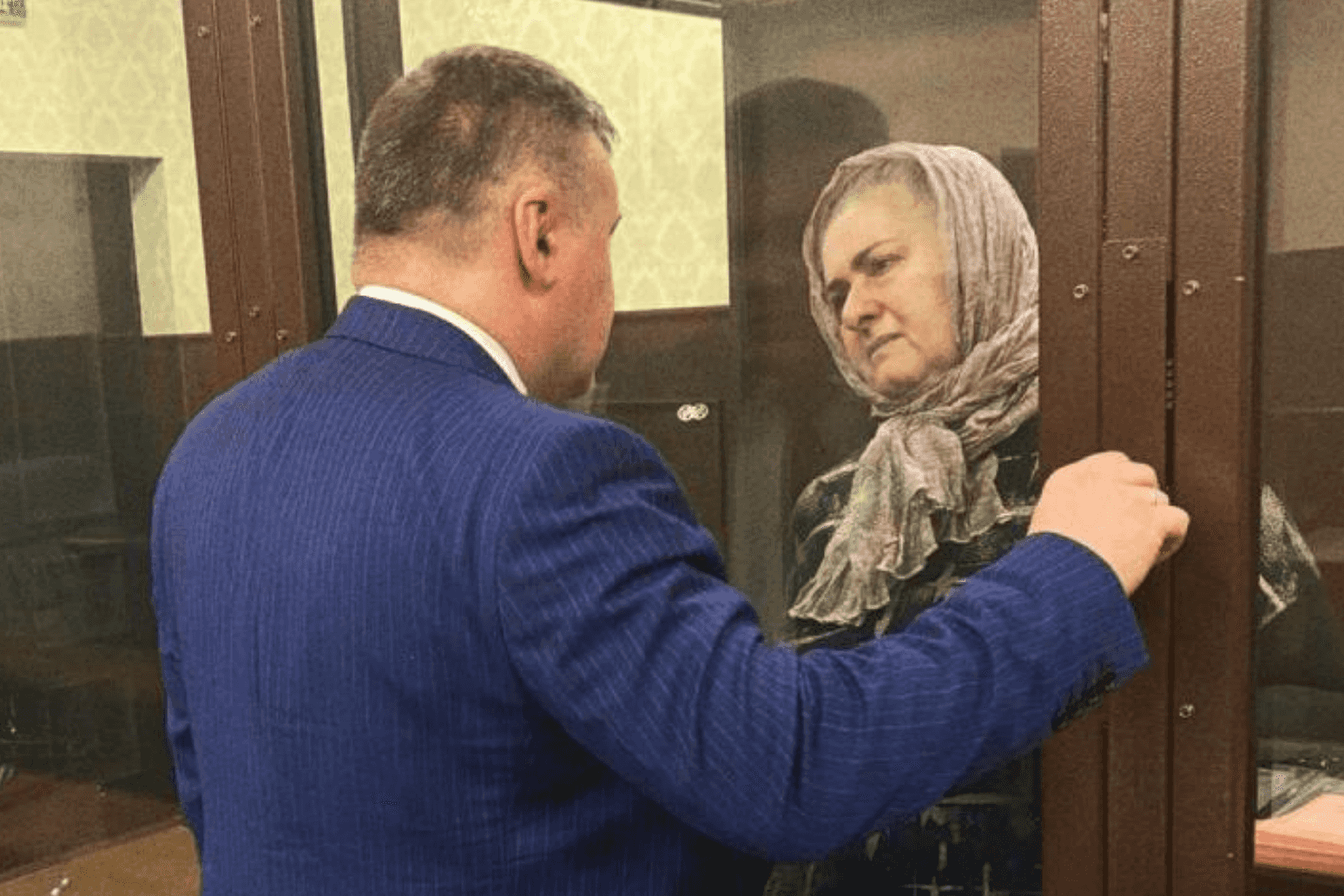
Ramzan Kadyrov’s brutal approach to politics combined with his insatiable hunger for power and status has devolved into behaviour towards neighbouring regions that is nothing less than medieval.
On 13 November, the head of the Chechen Republic, Ramzan Kadyrov, travelled to the mountainous Galanchozhsky District, a district that saw its borders expand in 2018 as swathes of Ingushetia were handed over to Chechnya. During the televised visit Kadyrov announced that he could take away all the Chechen lands in the universe from neighbouring Ingushetia by force if he wished.
The image of Kadyrov and his right and left hands, Adam Demilkhanov and Magomed Daudov, seated at a table in an open field, remind one of a familiar but rather hackneyed plot from a popular Turkish television series, in which Kadyrov takes the place of the founder of the Ottoman Empire, Osman I, and Daudov and Demilkhanov the place of his faithful beys.
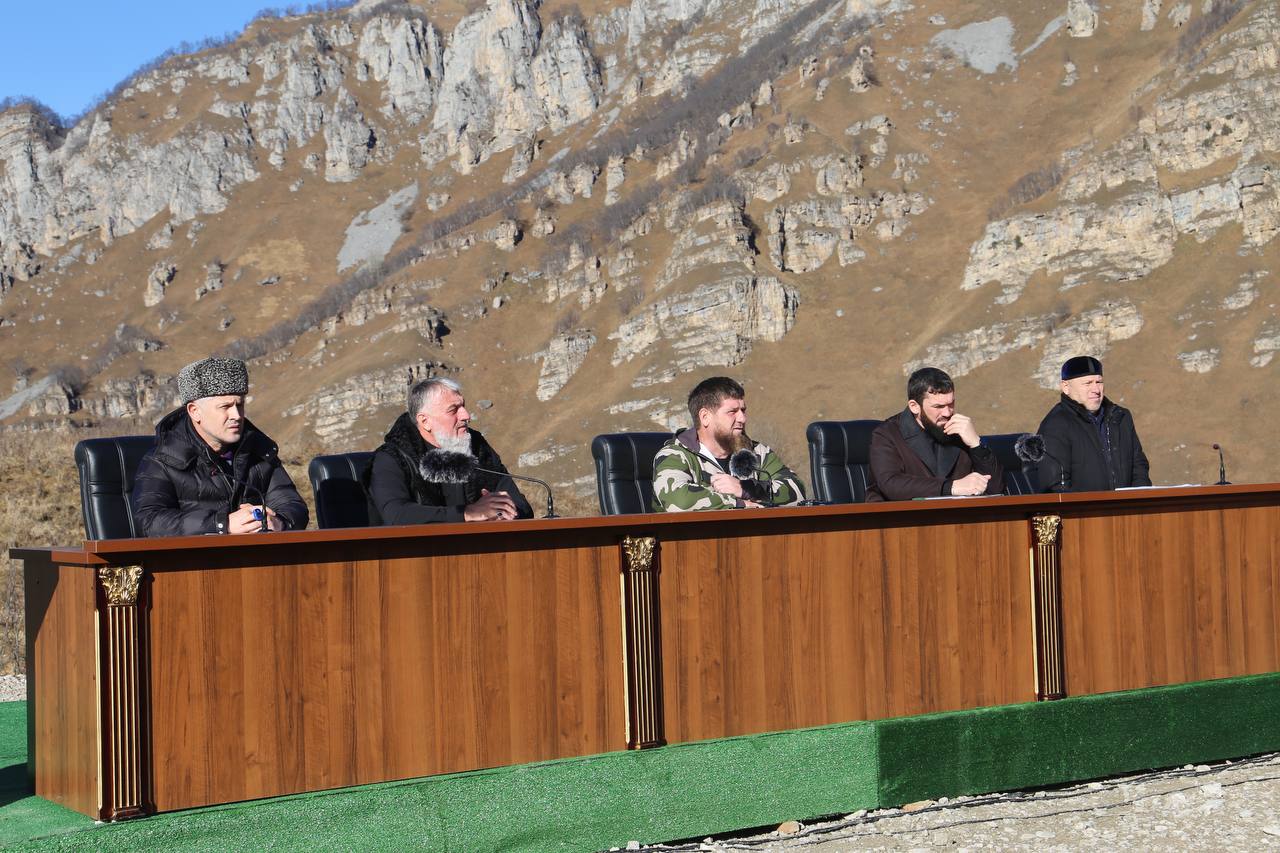
The only way to make the gathering more period-accurate would be to have Kadyrov and his cronies seated on horses instead of chairs, armed with sabres, and have them scowl menacingly at every mention of their enemies. Perhaps, Kadyrov’s bodyguards could even loose flaming arrows in the direction of Ingushetia at the appropriate dramatic moment?
In full accordance with early medieval etiquette, Kadyrov spoke a great deal about his might and the insignificance of his foes. He spoke of his army’s readiness to trample the enemy’s crops into the dirt, to drink up the water from their rivers, and sew enough sails for a fleet from the trousers of his vanquished foes. All this he would do, he threatened — but only if they tick him off.
This all begs the question: where in the Russian constitution is it written that irritating a regional head gives him the right to attack a neighbouring Russian region and seize its territory?
Just a few hours after the event, social media was flooded with memes and videos, with a particular focus on a bodyguard helping lift up Kadyrov’s leg as the sultan was getting into his car. Obviously, this was not the reaction Kadyrov was hoping for — surely he hoped that his words and projection of strength would stoke unity among the Chechen people in the fight for their native lands alongside their brother leader.
But what triggered this propagandistic misfire?
A changing river
Kadyrov was not just angry, but furious at an incident a few days prior to his trip to Galanchozhsky District.
During the construction of a new road on the territories transferred from Ingushetia to Chechnya in 2018, construction workers changed the course of the Fortanga river, which serves as the border between the two republics, in favour of Chechnya.
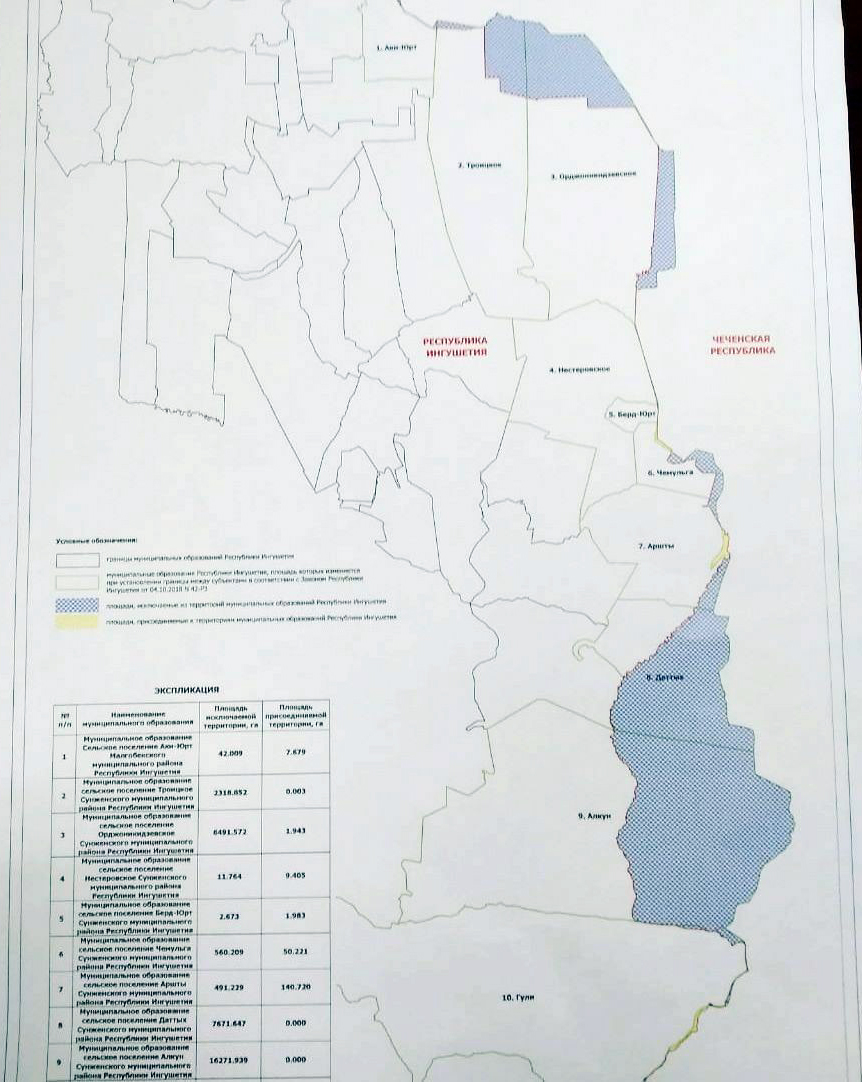
Local residents noticed and word quickly spread online — sparking a spontaneous rally in an Ingushetian village near the river. When the police arrived, with managers of the Chechen agency in charge of the construction of the road in tow, the latter explained that the change was purely technical and temporary. They also said that when construction was completed, the riverbed would revert to its original shape.
The protest could have passed for a regular misunderstanding, a result of ongoing tensions and lack of information among the public. But for Kadyrov, it was an intolerable slight.
He addressed Ingushetia and the Ingush people directly, and not in the firm language of modern diplomacy, but — true to form — in medieval fashion, peppered with numerous insults and provocations towards the Ingush.
Apart from general threats, he also voiced specific claims on the Malgobeksky and Sunzhensky districts of Ingushetia. He claimed the regions had been wrongly handed to the Ingush by Dzhokhar Dudayev, the first president of the Chechen Republic of Ichkeria.
‘If you do not calm down, I will take back everything Dudayev illegally handed over to you’, Kadyrov said. ‘If I take it all back, it won’t be good. We have the power to take it all back, despite that, we haven’t taken a single step, we haven’t said a single word.’
Who benefits?
All this said, I suppose that this is not about a few districts in Ingushetia or Chechnya. These territorial squabbles are of no interest to the corrupt Ingush and Chechen authorities. What they are interested in is real estate in Moscow, Saint Petersburg, and Dubai, as well as mixed martial arts, expensive cars and other luxuries.
According to one theory, all this fuss over the border is of the Kremlin’s making because issues pertaining to borders in the North Caucasus have been, and remain, some of the most closely watched and controlled by federal authorities.
Indeed, the Kremlin has been carving the borders for centuries in such a way that there are no people in the North Caucasus without territorial claims against their neighbours. The anger in such disputes tends to be aimed towards neighbours, not against Moscow, who drew the dividing lines in the first place.
Meanwhile, for the North Caucasian elites, enmity towards neighbouring republics is often the only glue binding them to their constituents.
There is little doubt that when Kadyrov was invited to sign the 2018 land deal with Ingushetia, he was following Moscow’s orders, not pursuing his own policy. Moscow’s reaction, or rather lack thereof, must be understood as a tacit endorsement, and not at all a sign of ignorance of the situation.
Despite the anti-Ingush hysteria fanned by the Chechen authorities, Chechens themselves question Kadyrov’s silence about the Aukh District of Daghestan, to which displaced Chechens have been unable to return since the mass deportations in 1944. For many, their old family homes, if not demolished, have already been sold and resold many times over.
The Ingush face a similar situation, as some of them cannot return to their homes in the Prigorodny District of North Ossetia, from which they were forced out in 1944 and again in 1992. Both Ingush authorities and public activists seem to care little about this problem either.
There is an opinion in Chechnya, according to the local residents I had a chance to speak to, that Kadyrov has outgrown Chechnya. It is too small for him and he is bored. Almost all of his enemies have been killed and the once fearsome insurgency suppressed. There were rumours that he could be transferred to Moscow, but it seemed like no one in Chechnya who knew him could say what post would be suitable for an academic, a general, and a hero of Russia — all fused into one person.
Having not found a position worthy of Kadyrov’s glory, Moscow decided to let him grow not in position, but in territory. The first candidate for such growth is Ingushetia — the smallest of all of Russia’s federal subjects outside of its federal cities. Though, for now, Kadyrov is still mostly limited to threats and cajoling.
‘They chose him themselves’
According to one of my interviewees, who for obvious reasons will remain anonymous, Kadyrov has been fomenting hatred towards the Chechen people with his actions since he came to power. His haughtiness, casual cruelty, and arbitrariness elicit distaste both from the FSB officer stationed in Chechnya who is personally berated by him and from the open-minded resident of Moscow who blanches at the torture and killings done at Kadyrov’s behest.
The Chechen people as a whole are then held responsible. As a Russian liberal recently put it: ‘they chose him themselves’.
This is said at a time when the Chechens are in a most humiliating condition and have, since 1999, been deprived of any choice at all except whether to pay their electricity or gas bill first, with the added question of if they have any money left over to pay their water bill.
But the most indicative and humiliating thing for Chechnya is the endless parade of public apologies on camera, made by Chechens who criticise Kadyrov’s officials and his decisions. So often has this happened, that locals have begun to joke and call Chechnya ‘Izvinistan’ (‘Apologystan’).
Now the situation seems to be developing in such a way that the territory of Apologistan will be expanded with the silent approval of Moscow. All the more so because noted academic and historian Ramzan Kadyrov has already come up with a scientific basis for future annexation of Ingush land, by stating that, in fact, the Ingush are not an independent people at all, but are ‘historically descended from the Chechens’.


